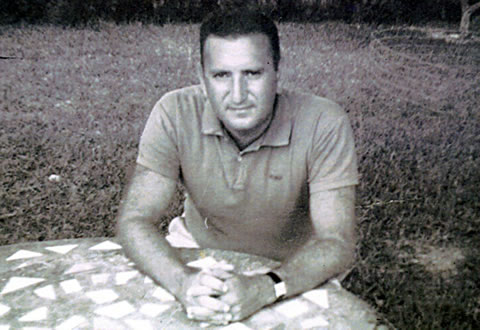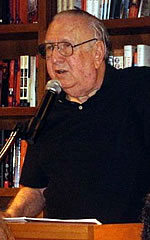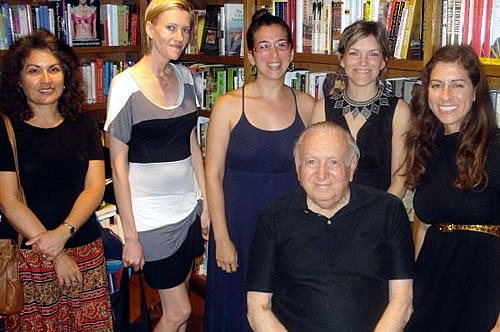A stellar career, a new scholarship
Interview with Lester Goran, Professor of English
By Margaret Cardillo

Fifty years ago, the nation was twisting to Chubby Checker, reading To Kill A Mockingbird and screaming at Psycho on the big screen. Also in 1960, Lester Goran, rising from the slums of Pittsburgh, entered his very first classroom as a teacher. Now the patriarch of the Creative Writing program at the University of Miami, Professor Goran’s fifty-year career includes successes both on the written page and in the classroom. The author of eight novels, a memoir, and three short story collections, his books have been praised by such publications as the New York Times, Vogue, and The New Yorker, among others. His students have gone on to become bestselling writers and award winners. A campus favorite, Goran gets weekly emails from former students giving him updates on their writing, praising him for his ability, and seeking life advice. With an unorthodox ascension into the literary halls of America, Goran is an example of tenacity, wisdom and great humor.
As Professor Goran enters his fiftieth year of teaching writing, a new scholarship fund has been started in his name through the Creative Writing department at the University of Miami. His former student, Margaret Cardillo (MFA ‘09), caught up with him (he’s still quick) to talk writing, teaching and life lessons.
This interview was conducted with questions from the author of the article and contributions from former MFA students Jason McCall and Vanessa Garcia.
Fifty years ago, what did you think you’d be doing today?
I hoped to be doing the same thing I’m doing right now: working at my obsession, putting together incoherent thoughts and moods into stories, and dealing with many young people that are on the edge of self-discovery.
What drew you to writing?
So many things were unexplained in my life. I decided to be a writer because of the kind of person I was. I couldn’t understand myself unless I partially fictionalized myself into a drama. Produced, directed and written by myself. It seemed to come so easily. Stories where the characters fit to my own satisfaction until I knew something about my time and place and a little of myself.
Who are your greatest writing influences?
When I was young: Somerset Maugham, Jack London, Mark Twain, Willa Cather (she wrote a classic short story about my high school), Aldous Huxley, Graham Greene.
I was writing before I knew to fashion words. I’d sit down and fill page after page with scrawls and I’d say they were a letter to someone else. And all the letters were usually asking someone for money for our family.
You grew up in a tough section of Pittsburgh. When you would go back, what did people have to say about your career choice?
I was generally admired not so much for my writing but that I demonstrated that people in these treacherous environments could contribute to society in meaningful ways, that our lives were not lost. My being published was kind of a scene because I really was such a different sort of person to them that it was almost embarrassing to discuss my writing with me.
How have things changed over the course of fifty years for your writing?
I don’t have that quality of the “new possibility.” My investments are long range.
What would you be doing if you weren’t a writer?
Never thought about it.
Is the profession of teaching compatible with writing?
More compatible than other things. I can’t imagine being a coal miner and writing—too fatiguing. I was absolutely untrained [for teaching] and never planned to graduate high school but the coach in high school needed me on the team and I didn’t want to let him down. But I haven’t been unhappy with being a teacher once in my life. I’ve been unhappy with myself, situations, classes, but never unhappy with wanting to teach.
Why do you continue to teach year after year?
Teaching is a part of my nature. It keeps me in balance. I enjoy myself.
What have MFA programs done to writers and writing?
Well, we have created an institution to serve such a category. As a writer, I’m not sure it’s a good thing because writers are not a homogenized group. There is no such thing as a writer—only individuals who want to write.
As a writer, do you really think you can teach anybody to write?
Haven’t made up my mind yet. But I’ve had some luck with writers. I’ve watched them go and do what they want to do. I enjoy talking with people who it seems to me really want to write.
What’s the worst writing technique that students use that just won’t go away?
Thinking that they don’t have to rewrite. Spontaneity can occur in ten different revisions. There’s a part of my first novel I rewrote sixty times. I know it was sixty because I counted. I thought, My God am I ever going to be done?
I don’t believe there is such a thing as not rewriting. I don’t think of things as first draft, second draft… As soon as I write it I know I’m going to rewrite it the next day.
What are you most proud of in your writing career?
Saying things exactly the way I wanted them said.
What are you most proud of in your teaching career?
There are students who feel that they got something out of particular class. I was at a birthday party on Sunday night and a student I had thirty years ago came up to me and told me how much my class meant to him. He was a gastro-entomologist.
Bigger reward: writing or teaching?
Writing is the bigger reward because there is a sense of completion. With teaching there is never completion. There’s always another class.
If you could go back in time and talk to yourself the day before you taught your first class, what would you say?
You made the right choice.
What’s the best advice you can give an aspiring writer?
Always remember that you are in a process of growth. Do not take yourself too seriously. You will never know when you have arrived.







